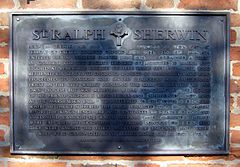Ralph Sherwin
Saint Ralph Sherwin | |
|---|---|
 A plaque in his birthplace erected by the Sherwin Society | |
| Priest and Martyr | |
| Born | October 25th, 1550 Rodsley, Derbyshire, England |
| Died | 1 December 1581 (aged 31) Tyburn, London, England |
| Venerated in | Roman Catholic Church |
| Beatified | 29 December 1886, Rome by Pope Leo XIII |
| Canonized | 25 October 1970, Rome by Pope Paul VI |
| Feast | 1 December |
Saint Ralph Sherwin (25 October 1550 – 1 December 1581) was an English Roman Catholic priest, executed in 1581. He is a Catholic martyr and saint.
Life
Sherwin was born at Rodsley, Derbyshire, and was educated at Eton College. In 1568, he was nominated by Sir William Petre to one of the eight fellowships which he had founded at Exeter College, Oxford,[1] probably influenced by Sherwin's uncle, John Woodward, who from 1556 to 1566 had been rector of Ingatestone, Essex, where Petre lived. A talented classical scholar, Sherwin graduated Master of Arts on 2 July 1574, and the following year converted to Roman Catholicism and fled abroad to the English College at Douai, where he was ordained a priest by the Bishop of Cambrai on 23 March 1577. On 2 August 1577, he left for Rome, where he stayed at the English College, Rome for nearly three years.
On 18 April 1580, Sherwin and thirteen companions left Rome for England. On 9 November 1580, he was arrested while preaching in the house of Nicholas Roscarrock in London and imprisoned in the Marshalsea, where he converted many fellow prisoners, and on 4 December was transferred to the Tower of London, where he was tortured on the rack and then laid out in the snow. He is said to have been personally offered a bishopric by Elizabeth I if he converted, but refused.[1] After spending a year in prison he was finally brought to trial with Edmund Campion on a charge of treasonable conspiracy. He was convicted in Westminster Hall on 20 November 1581. Eleven days later he was taken to Tyburn on a hurdle along with Alexander Briant and Campion, where the three martyrs were hanged, drawn and quartered. Sherwin's last words were "Iesu, Iesu, Iesu, esto mihi Iesus!"[2]
Sherwin was the first member of the English College in Rome to be martyred. He was beatified on 29 December 1886 by Pope Leo XIII.[3][4] He was canonized on 25 October 1970 by Pope Paul VI as one of the Forty Martyrs of England and Wales with a common feast day of 25 October. His individual feast day is celebrated on 1 December, the day of his martyrdom.
Notes
- ^ a b "The martyr who gave up worldly fame for the scaffold", Catholic Herald, November 24, 2010
- ^
 Herbermann, Charles, ed. (1913). "Blessed Ralph Sherwin". Catholic Encyclopedia. New York: Robert Appleton Company.. Accessed 2011-10-18.
Herbermann, Charles, ed. (1913). "Blessed Ralph Sherwin". Catholic Encyclopedia. New York: Robert Appleton Company.. Accessed 2011-10-18.
- ^ Acta Sancta Sedis Vol. XIX (1886-1887), pp.347-350. In Latin (as Rodulphus Sherwin). Retrieved 2011-10-18.
- ^ Patron Saints Index: "Saint Ralph Sherwin" Accessed 2011-10-18.
External links
- "Blessed Ralph Sherwin" in Lives of the English Martyrs Declared Blessed by Pope Leo XIII by Edward S. Keogh, Dom Bede Camm. Vol. 2 (1905). (Vol. 1 has list of 63 martyrs and beatification decrees in English).
- "www.ralphsherwin.com" - site administered by the Sherwin Society.
![]() This article incorporates text from a publication now in the public domain: Herbermann, Charles, ed. (1913). "Bl. Ralph Sherwin". Catholic Encyclopedia. New York: Robert Appleton Company.
This article incorporates text from a publication now in the public domain: Herbermann, Charles, ed. (1913). "Bl. Ralph Sherwin". Catholic Encyclopedia. New York: Robert Appleton Company.
- Use dmy dates from April 2012
- 1550 births
- 1581 deaths
- Forty Martyrs of England and Wales
- People educated at Eton College
- English College, Douai alumni
- English College, Rome alumni
- Anglican priest converts to Roman Catholicism
- 16th-century English Anglican priests
- English Roman Catholic saints
- Fellows of Exeter College, Oxford
- 16th-century English Roman Catholic priests
- Prisoners in Marshalsea
- People executed under Elizabeth I of England by hanging, drawing and quartering
- Executed people from Derbyshire
- 16th-century Christian saints
- 16th-century Roman Catholic martyrs
- People from Derbyshire Dales (district)
